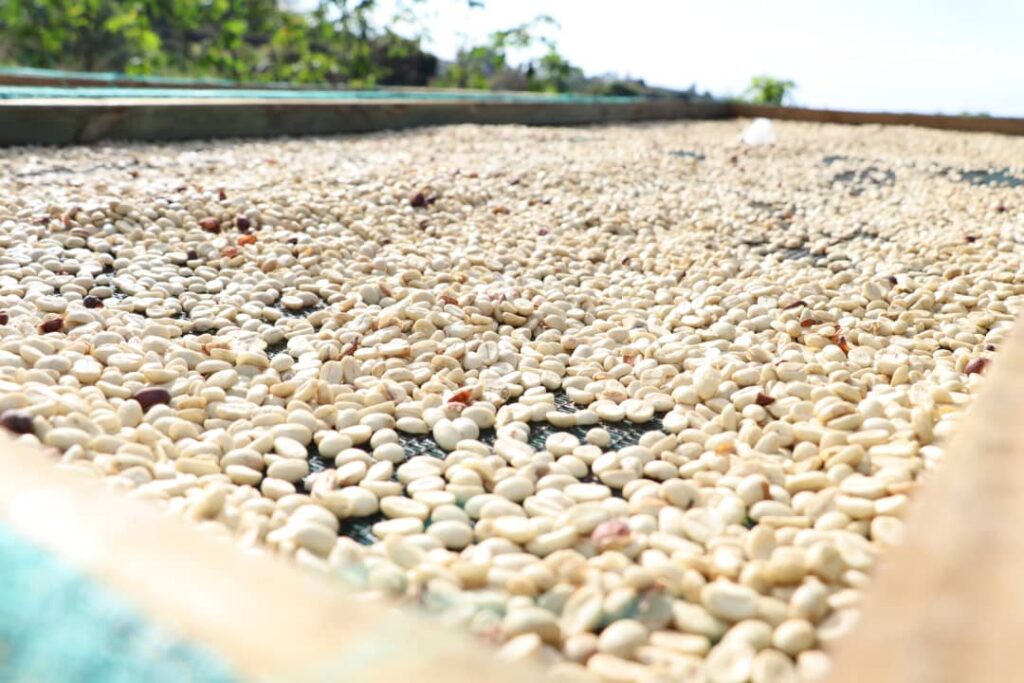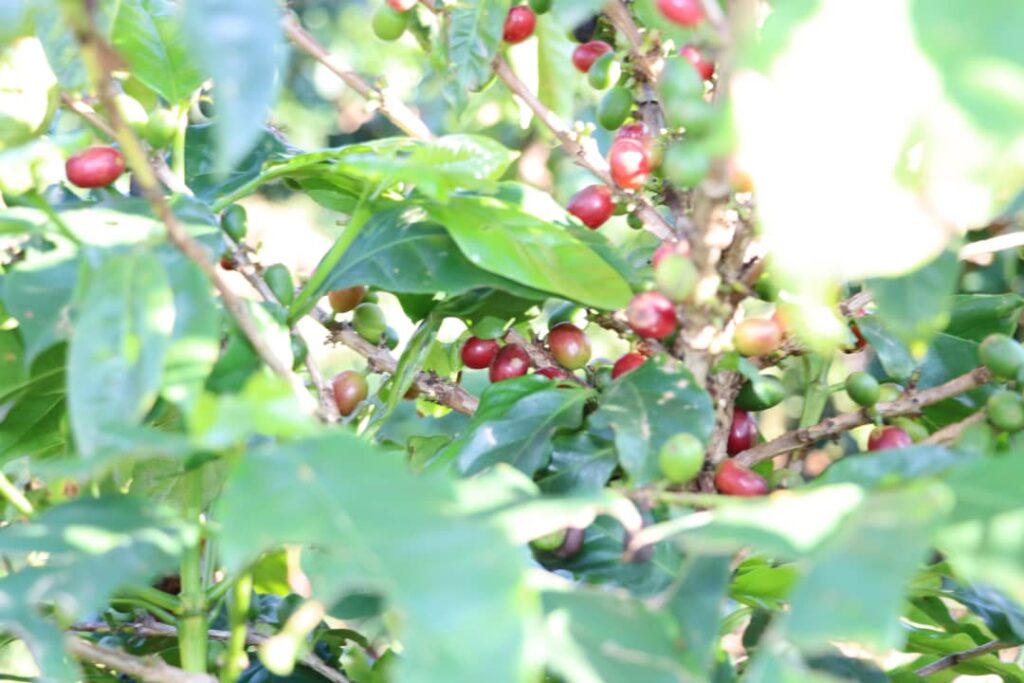
Coffee is seldom produced in Eswatini. The two founders of Eswatini Coffee see this as an opportunity and seek to lift the country’s coffee production, and their communities along with it.
Their motto is, “to help others and set them up to succeed.”
Eswatini Coffee was established in 2018 by two local entrepreneurs, Patrick Du Pont and Eddie Mkhatshwa. They were inspired by Johan Hein, an aviation expert from South Africa who asked them about coffee production in Eswatini during a visit.
When he found out it was virtually non-existent, he invited them to White River, Mpumalanga in South Africa to visit Robbie Neal, a coffee farmer and friend.
“We got into the car and headed to White River. After meeting Robbie, we started planting 2,000 organic Arabica coffee plants at Elwandle and that is how Eswatini Coffee was born,” says Du Pont.
They started with just three hectares in 2018 but gained experience over time, and garnered confidence to expand their hectares.
By the end of 2019, they had reached over three hectares, and today they count approximately 4.3 hectares of coffee. The coffee is grown using organic materials.
“We started the project from our fields in Elwandle in Eswatini. In 2020, we gathered our first harvest which was half a ton from our old trees. In 2021, our harvest increased to a ton. In 2022, it shot up to three tons.”
The concept of Eswatini Coffee is to grow coffee by leveraging local communities.
“We included as many people as possible because, in the coffee sector, a powerful negotiation tool is a quantity,” says Mkhatshwa.
For instance, if the export market needs eight containers, there is no way we can be able to ship that order alone, without manpower. We wanted to ensure we have the right volumes to access the export market.”
Coffee crops for rural community empowerment
The project’s core intention is to create jobs, alleviate poverty, and create opportunities for economic empowerment within rural communities, to avoid rural exodus.
The two entrepreneurs wanted to establish and scale up the production of a crop that could compete with Eswatini’s thriving exports in the long term, with the possibility of quality differentiation and better prices later on.
They also seek to offer equal opportunities to both men and women, with a focus on the professionalization of women in the coffee sector.
Eswatini Coffee has gradually expanded its coffee-growing operations to approximately seven locations in Eswatini.
As coffee growing in Eswatini is still a nascent activity, the operation has established 10 demonstration plots in different areas to study the adaptability of the coffee in each place.
Eswatini Coffee is currently working with 112 farmers in total from these communities – a big leap from the original 33 farmers they had planned on engaging, and a testament to a successful buy-in from Eswatini’s rural communities. These farmers have created close to 100 jobs collectively.
Mkhatshwa shares that they expect their first harvest from the various lots in the next two to three years. Eswatini Coffee also offers extension assistance to all the farmers and monitor them closely.

“We will continue to help them with new varieties and to get a better income for their coffee,” he says. “We also have good contacts from Ghana, Uganda, and India who help us share information and offer assistance to navigate issues like pests and diseases.”
By the end of this year, Eswatini Coffee aims the establishment of a strong association for coffee farmers from all the farming communities that focus on quality, value addition, and enabled access to the international market.
Du Pont says they plan to assist the farmers on de-husking and grading the coffee they produce, and on the rest of their export logistics to ensure that they earn more from their coffee.
EU-ITC Alliances for Growth in Eswatini
With support from the European Union and the International Trade Centre’s Alliances for Action sustainable agribusiness programme, Eswatini Coffee has been able to connect with coffee growers from other countries, and to return with new coffee species.
“Before, we only planted arabica coffee, but we are now exploring the potential of growing the robusta species as well,” says Du Pont.

The EU and ITC enabled Eswatini Coffee to go for a coffee study visit in Uganda, which is known primarily for Robusta coffee production and has set ambitious goals to quadruple coffee production in the coming years.
Under the same umbrella of support, the enterprise also attended high-level international trade shows in 2023 like World of Coffee Dubai, Specialty Coffee Expo in Johannesburg, and World of Coffee Athens to gather intel on coffee sector trends and to build commercial linkages.
The EU and ITC have also assisted Eswatini Coffee in establishing a nursery to support farmers who want to start growing coffee from seedlings. They currently produce 15,000 to 30,000 seedlings annually for both the arabica and robusta species.
To meet farmer demand, the goal is to expand nursery production capacity to at least 60,000 to 70,000 seedlings per year.
Rural community across borders: Supporting Botswana
Eswatini Coffee is also working beyond Eswatini, with farmers from Botswana, starting with two farming families who are seeking to establish and scale up production.
“So far, the results are impressive and we are very happy to continue to support them to continue to build up the volume that could be required by the export market,” says Du Pont.
Botswana is also part of the six Southern African Development Community (SADC) member states that form part of the EU-SADC Economic Partnership Agreement (EPA).
The EPA grants the contracting parties a series of benefits that include amongst others, duty-free and quota-free access to the EU market.

Eswatini Coffee is part of the small and medium enterprises supported by the EU-funded “Eswatini: Promoting growth through competitive alliances” programme implemented by ITC’s Alliances for Action initiative.
Its main objective is to support job creation for small farmers, entrepreneurs, and artisans. It also seeks to promote export-led growth, primarily through the full utilization of the SADC-EU-EPA. M
EU Programme Officer Luis Miguel Pascoal says they are supporting this project because they believe that growing quality coffee can boost local economies and benefit farmers.
“The aim of this support is to enable farmers to grow high-quality coffee to boost their income year-on-year and stimulate the local economy,” he says.
“We want to help them get premium prices for their coffee and improve their standard of life. Most importantly, this kind of support seeks to expand the market for local quality coffee and create long-term opportunities for sustained growth. We hope that in the long term, this project will increase Eswatini exports to the EU and contribute towards the full utilization of the SADC-EU-EPA.”
